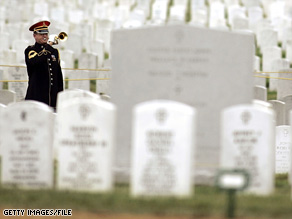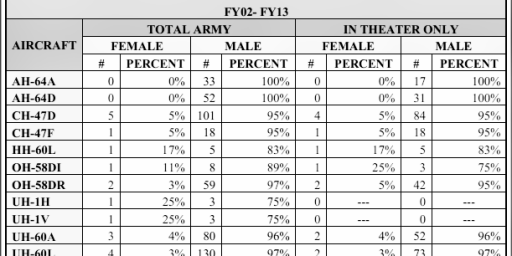Iraq War and Female Casualties
Female troops are getting killed and wounded in Iraq in unprecedented numbers, reports the Philadelphia Inquirer.
[N]early 400 female service members … have been wounded in Iraq during a war where women have been more exposed than ever to combat. At least 11 have had amputations. More than 50 others have been killed, according to the Defense Department.
Although barred from direct frontline fighting roles, female soldiers have often been under fire at base camps, scurrying for bunkers as mortar rounds rain down. Many others have been attacked in supply convoys. The longtime debate over the role of women in the military has grown heated since the war in Iraq began, and especially since Jessica Lynch’s much-publicized ordeal put a female face on a soldier in combat.
[…]
The losses stand in contrast to other wars, such as Vietnam, where eight female military nurses died – only one of them to hostile fire – and women were usually assigned to areas well out of the line of fire.
Today’s increased combat risk follows 14 years of Defense Department policy changes. In 1992, the Air Force allowed women to fly some missions exposed to combat. The next year, the Navy allowed women on combat ships. And in 1994, female soldiers in the Army were no longer barred from positions that posed a substantial risk of capture.
The policy said service members “are eligible to be assigned to all positions for which they are qualified, except that women shall be excluded from assignment to units below the brigade level whose primary mission is to engage in direct combat on the ground.” Although not assigned to ground combat units, women fly helicopters, serve in bomb-disposal squads, drive trucks, handle checkpoints, and treat the wounded on battlefields – leaving them open to lethal fire.
Interestingly, aside from a spike during the Jessica Lynch story, the public has been remarkably uninterested in this issue, accepting the death of female troops as natural as that of males.
American Female Casualties of Wars
World War I: At least 359 servicewomen died, mostly from influenza and vehicle and aircraft accidents.
World War II: 543 died, mostly from vehicle and aircraft accidents. Sixteen Army nurses died from enemy fire.
Korean War: 17 died, mostly from vehicle or aircraft accidents.
Vietnam War: 8 died, one from hostile fire, one suicide, and the rest from vehicle and aircraft accidents.
Gulf War (Operations Desert Shield and Desert Storm): 16 died, mostly from vehicle and aircraft accidents and hostile fire.
Iraq war: 52 have died from hostile fire, and 378 have been wounded in action.
SOURCES: Women in Military Service for America Memorial Foundation; Defense Department.





“Interestingly, aside from a spike during the Jessica Lynch story, the public has been remarkably uninterested in this issue, accepting the death of female troops as natural as that of males.”
Good. Because it is. Being a soldier is not a ‘safe’ occupation. For either sex.
john wayne would be proud[gacy that is]!!
First, all women in the military, including those wounded in action, should be praised for doing something most people don’t do: serve their country.
From the source article:
O.K. so why then the differences in requirements for female and male soldiers?
Well, o.k. A woman CAN fly a helicopter, drive a tank, or whatever else. But should she be promoted ahead of her male peers because she can WALK the 2-mile run and pass? Is there any reason in a woman’s physiology that she cannot do as many situps as a man?
Absolutely. So why not step up to the plate. Women are selected for flight school and other trainaing programs, promoted, and ultimately further their careers and get paid more based on their performance. Why there is a different standard for men and women is beyond me. I believe the real women warriors out there would want it to be that way.
everybody serves. try NOT paying your taxes!